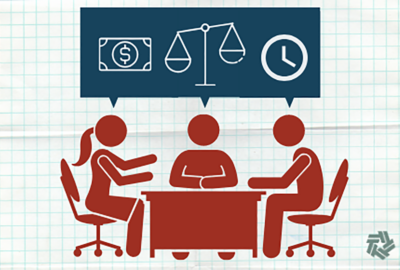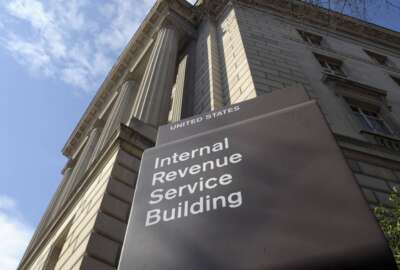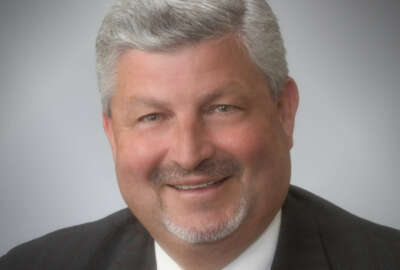Meet the new president of a large federal employee union
She spent 20 years as a revenue officer at the IRS. Then she went into union work, serving for 14 years as president of a local in Wisconsin. Now she's the new...
She spent 20 years as a revenue officer at the IRS. Then she went into union work, serving for 14 years as president of a local in Wisconsin. Now she’s the new national president of the National Treasury Employees Union. The Federal Drive with Tom Temin was joined in studio by Doreen Greenwald.
Interview Transcript:
Tom Temin All right. So, IRS, you are central to what got NTEU started in the first place, which was basically IRS people. What motivated you to kind of switch from the revenue officer career to a union work?
Doreen Greenwald Well, I worked for the IRS for overall for 35 years, 20 of which was as a revenue officer. And throughout all of the jobs I had at the IRS, NTEU in the workplace was evident to me that it helped things work smoothly. It helped to address employees issues early on so they didn’t get out of whack. It allowed employees to have a voice in their workplace and make sure that they could have a say in how things changed. Asking people who do the work is the best way to make changes in a workplace and make sure they’re working as efficiently as possible. And that’s what introduced me to the National Treasury Employees Union.
Tom Temin Interesting. So did you find that the IRS would ask the people doing the job about change and the best way to do things because they had to because of the NTEU in place, or do you feel like that’s what they really thought was a good practice also?
Doreen Greenwald No, I would say without NTEU in place, those kind of questions wouldn’t be asked of the frontline workforce. Having a contract and having procedures in place that allow employees that voice and making them have a voice at the table and key decisions that impact their work lives makes a huge difference. And that doesn’t happen without a union in the workplace.
Tom Temin And the IRS has always been decentralized. They used to have these large I guess they still do to some extent, processing centers where all that paper got handled. And so there must have been some variation in general employee treatment and approaches from place to place. Maybe the union presence helped keep things a little bit more uniform, perhaps.
Doreen Greenwald I would agree with that. Obviously, IRS is a huge operation. It does have submission processing centers, it has service centers. And I worked in a field office. And so each one of those is a different work environment and each place NTEU has a voice in those workplaces. For example, I worked in a field office where revenue officers and revenue agents, people who actually went out in the field, did audits and did collections, had issues that were involved about work life balance, about making sure you are safe in the workplace. And so those are things where NTEU would step up and there’s different issues in a submission processing site, all of which NTEU has people on the ground working with frontline employees to address those issues.
Tom Temin And I want to get a little bit more of your own biography. 35 years is a long time for the IRS. That’s almost a quarter of the time it’s even existed in some sense. And what got you into that work in the first place and what were the highlights?
Doreen Greenwald Well, I think for most people that work for the federal government, it’s something you’re not sure about when you enter. I was excited, I took a civil service test. At the time I thought, Oh, I’ll check out the government and see until I find something different. And then when I became a civil servant and took an oath to the Constitution and the mission of the service, I was proud of the work I did. And I really loved helping America’s taxpayers. The IRS gets a bad rap of having to collect taxes, nobody likes to pay taxes. But I will tell you the people who work for the IRS are proud of what they do. And I loved it. And so what started out to be a one or two year career turned into 35 years in a blink of an eye. I met great people along the way and really was able to serve and give back to the community, which gave me great pride.
Tom Temin And sometimes the IRS is not popular with certain elements of the public. Was that ever really an important issue?
Doreen Greenwald It’s always an important issue. As I said being a revenue officer, my job was to collect taxes and returns. A big part of that is education. People are really good at what they do, but they don’t always understand the tax laws and they can be quite complex. People also need to realize those tax laws are passed by Congress, not by the IRS. So we’re doing a job that Congress sets us out to do. So in that realm, yes, you run into people who aren’t happy with some of the work that you have to do. But my job was to educate them and to help them to fulfill their requirements. And so for the most part, I would say people were very cooperative. But we always had tools to deal with those who chose to not be cooperative.
Tom Temin Sure. We’re speaking with Doreen Greenwald. She’s national president now of the National Treasury Employees Union. And what are your general goals for NTEU?
Doreen Greenwald My general goals are to obviously grow our union. We have a very strong union and 35 federal agencies. We have new generation coming on board in the federal government. And I want people to be proud of being federal servants once again and proud of their union. And so I’m going to look to expand and educate people about the role of a union in the federal government and how important it is to federal employees.
Tom Temin And what have you found with some of the young people may be coming in? How receptive do they arrive at, say, the IRS or one of the other 35 agencies? Do they tend to be receptive to this idea or is that something that they feel is passé?
Doreen Greenwald Actually, I think they’re very receptive. What we’re finding is a new generation that hasn’t been exposed to unions in the past. And so this gives them an opportunity. Also, they’re the voice of the workforce on the front lines where they’re not getting the support they need from management. And so NTEU is there for them to help them, guide them and lift them up and so that they’re successful in their career.
Tom Temin IRS management, management in general, gets dinged by line employees. That’s kind of as old as human history. But in your experience, what makes a good manager from your standpoint what makes someone good for the union, that they have a counterpart that is sympathetic, maybe not sympathetic, but empathetic and understands why the union is there.
Doreen Greenwald That’s one of the myths of unions is it’s anti management. And I will tell you, we’re not anti management, we’re anti bad manager. And so what I would say is you want a good manager who communicates well with their employees that’s there to address their needs, help them if they need additional training, identify that provided for them. That’s what you want in a manager, is to be there and be supportive of you. Unfortunately, not all managers have good skills in communicating. They may be good at the work they did, but managing is a different set of skills. And so we try to work with managers to make sure they have the skills they need and to make sure they have the training they need to be better managers to help employees.
Tom Temin And the challenge, I guess, at some level is that employee membership in the union that happens to represent an agency. There’s no such thing as a closed shop in the federal government. So you have to always be convincing people to stay in and pay their dues, even though they know they’re benefiting from what the union may do if they’re not a member. How do you meet that challenge?
Doreen Greenwald It is a challenge because, as you said, employees have the right to join a union or not join a union in the federal government, but they all benefit from the work that the union does. And so that’s part of my role and part of all of our leaders roles across the country is educating people about all the things that union dues pay for, such as our contracts and having people on the Hill to fight for them and do all of the things necessary to provide a better workplace for them. That doesn’t come for free. And so we want to have as many people involved and their voices as part of our actions going forward. And so that’s an ongoing discussion that we have with the workforce.
Tom Temin And what kinds of signals are you getting from the current regime at IRS?
Doreen Greenwald We have a very good relationship with the current regime at IRS. I don’t know that I’d call them a regime. But the commissioner, Danny Werfel, has been a very positive influence. He understands that the changes needed at the IRS to deliver for taxpayers starts with the employees of the IRS. And so he has a huge undertaking now that they receive funding from the Inflation Reduction Act to really help them rebuild the IRS, because for over a decade the IRS has been gutted by budget cuts. And so while the complexity of taxes has grown and the base in which IRS employees must serve as taxpayers has grown, the workforce has been diminished. And so it’s on his task to bring on new employees, train them so that they can provide the services that Americans deserve.
Tom Temin And in advocating before Congress, which the federal employee unions do, and they’re not shy about that. Have you ever wanted to say to whatever the committee is or several committees, Clean up that darn tax code. That’s the fundamental problem that seems to plague almost everyone that deals with taxes in the United States, is the length and complexity and subtlety of something that ought to be really simple.
Doreen Greenwald Well, from a union standpoint, we don’t get involved in the policy of government. So if Congress doesn’t like the tax code or feels it’s too complex for taxpayers, it’s their job to clean it up, absolutely. But what I will say is we tell Congress is if you want us to service taxpayers, and that is our mission, you have to fund us to do that. And that’s been kind of a problem because you want service, but you don’t want to pay for it and you can’t get it for free.
Tom Temin And in the day to day workings with IRS, local officials and local managers, and maybe at the national level to, what are the types of issues that tend to come up the most for the union and management to talk about?
Doreen Greenwald So over the last decade or so, with the cutting of budgets, IRS employees, there’s just been so much that they’ve been asked to do without the resources and supplies. And so now that this funding is there, we want to make sure that the IRS uses it appropriately and efficiently, and that it supports the employees they’re bringing on and hiring and creates a system that they can attract and retain employees going forward. Because it costs a lot of money to train employees and it takes a good 2 to 3 years before somebody is trained to do their job efficiently. And so when you have employees who are not, their needs aren’t being met in training is a big issue and having good managers, and that involves training the managers. You see a high attrition rate. And so we want to work through that and make sure that employee’s needs are met so they stay and that they do a good job for the American people.
Copyright © 2025 Federal News Network. All rights reserved. This website is not intended for users located within the European Economic Area.
Tom Temin is host of the Federal Drive and has been providing insight on federal technology and management issues for more than 30 years.
Follow @tteminWFED






